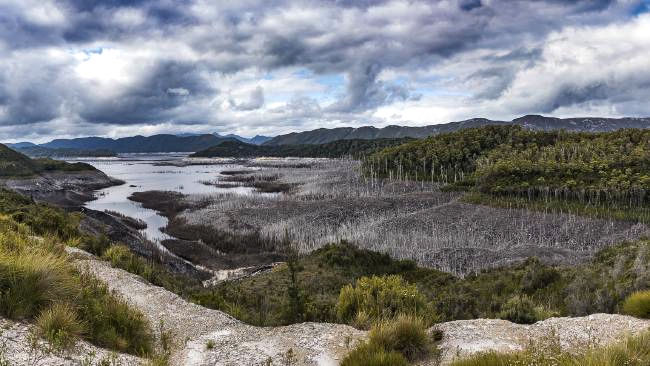In a fractured political environment, we need economists and scientists to take a unified position on the impact of climate change.

A depleted Lake Gordon in late March, with water levels below 7 per cent. PHOTO Matthew Holz/Mercury
Tasmanians are rediscovering the fact that our economy depends heavily on a stable climate with a reliable rainfall – a lesson never lost on farmers but easily forgotten in the cocoon of urban life.
Last week’s Senate inquiry painted a grim picture of the cost of Tasmania’s energy emergency which we’ll eventually see in power bills, a small sample of the impact of a destabilised climate on local, national and global economies.
Some economists consider themselves scientific; some scientists say that’s bunkum, but the two vocations have much in common. They’re both forced to use modelling as a primary tool because so many of their research questions can’t be tested in controlled experiments. Both have a fundamental interest in human activity. The economist studies how we produce, consume and invest; the climate scientist focuses on what these activities are doing to the planet.
Yet there’s been little cross-fertilisation between the two, and that’s at the heart of our failure to address the threat from climate change. We need them to reclaim that common ground.
Some have sought to bridge the gap. Nearing the end of an distinguished career studying planetary systems, the US physicist James Hansen now campaigns for an economy-wide “fee-and-dividend” scheme for lowering emissions. So far he’s had little response from economists.
Herman Daly (US), Nicholas Stern and Tim Jackson (UK) and Australian Ross Garnaut are among economists who in different ways have drawn on science to formulate new economic paradigms for their post-industrial age.
The commercial world is just starting to realise the impact of economic activity on natural systems. A global economy has a huge environmental impact. If its cost structures don’t acknowledge this it will eventually collapse, and that might happen sooner than we think. Global business leaders including Bank of England governor Mark Carney and US magnate Michael Bloomberg are now openly advocating that companies include climate risk information in regular financial reports.
Economic study in this field has been looking at how climate change creates stranded assets, where it becomes clear that certain carbon-intensive businesses have no future. Now we’re seeing a shift in focus to the direct economic impact of unmitigated warming.
This month Nature Climate Change published UK research showing that continued high global emissions will dramatically hit future economic prosperity. It found that failure to contain warming below 2C by 2100 will put at risk 1.8 per cent of global assets worth a total of US$2.5 trillion, with a possibility that the risk could be as much as five times the total market capitalisation of all fossil fuel companies today.
Property values will be a big part of this risk; well over 100,000 Australian coastal properties are at risk from sea level rise and storm surge this century. If it was ever an option to meet adaptation costs through strong economic growth, that’s long gone.
Tasmanian economist Saul Eslake believes that last week’s International Monetary Fund’s multi-year forecast of weak economic growth is optimistic because it didn’t account for lower growth in labour productivity and the working-age population in wealthier countries, including Australia.
He told me last week that a slower economy made mitigation measures more important. “Like most other economists, I would put pricing carbon at the top of any list of such measures.”
Economists and scientists agree that early, decisive measures, with the cost spread over time and across the whole economy, will cost a fraction of the enormous price we’ll pay for failing to cut emissions. We discarded a pricing scheme; it’s now starkly obvious that we can’t do without one.
All parties supported carbon pricing until Tony Abbott declared war on it in 2009. Recovering political consensus will need time and a lot of effort by leading professionals in science and the economy, but it has to happen.
There could be no better time than now for scientists and economists to come together in numbers, perhaps through their professional organisations, and say with one voice, this has to change.
